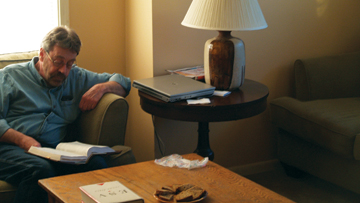You have free articles remaining this month.
Subscribe to the RP Witness for full access to new articles and the complete archives.
You fell to your knees, wincing as you hit the ground on your open wounds. You felt embarrassed as the surrounding crowd stared. You knew they believed you weren’t worth the time of day.
It wasn’t terribly surprising. No one thought you were worth the time. Not your parents, when they found out you had it; not your friends, who mysteriously lost your phone number when the disease showed; and certainly not the crowds, who discarded you when they realized who you really were.
You noticed something different with this one person. Sure, the crowds were following him, but you sensed something unique. So you fell to your knees before this man, making your hideous pain obvious to the crowd who looked at you in scorn.
You certainly didn’t want their leering eyes on you, nor did you want Twitter photos circulating the internet or Facebook posts using your pain as someone’s momentary entertainment. But you felt the need to thrust yourself on bloody knees because this man might love you in spite of the disgusting burdens you carry.
So you, the leper, dropped to the feet of Jesus. And you asked Him, “Lord, if you will, you can make me clean” (Matt. 8.2).
That day, your cry was answered. God saw you in your pain. He stood beside you amidst the skeptical eyes of the crowd, and He answered.
Why do all four Gospel accounts show Jesus meeting the outcasts? He meets the lepers in the Synoptic Gospels, and adulterers and paralytics in John. Why do the Gospels show God overturning impurity in its most visible form? Perhaps it is because God wants us to know that He is in the business of grace. He meets the people that a selfish society discards and brings them into His loving embrace.
He welcomes the lepers, the tax collectors, the sinners, the children, and the adulterers. It is impossible to read the Gospels without bumping into an account wherein God finds humanity in its despair and answers with hope through grace.
The Body of Christ in Action
The saints at Rochester RP Church saw the bloody knees on the leper and wanted to live out the grace that gave them salvation. The Lord gave us an opportunity. He showed us a man in need of grace. He showed us a man who came to Christ expecting to be made clean, a new Christian in a challenging situation.
The world was stacked against him. The only housing he could afford was uncomfortably situated between two drug dealers. He was a man trying to follow Christ in a world that desperately wanted him to fail.
One night, after he lost his job, he called me. “I can’t do this anymore,” he said. “I’m not good enough for your church. I folded under the pressure of temptation, and I’m taking off.” I was devastated. I had seen so much growth in him.
A deacon and I found him in downtown Rochester near midnight. As the flickering blue streetlight buzzed above us, I preached the gospel. I reminded him that the gospel is about forgiveness; it’s about grace and redemption. He insisted that he wasn’t good enough for it, and slipped into the night.
We could do nothing but pray, trusting that God would not let him fall away as he walked into the darkness. We drove home in silence.
The phone rang. “Hey pastor,” he said. “I’ve never done this before, but can you pick me up? I don’t know what to do, but I know Jesus can help.”
I didn’t know what to do either, but his faith gave me hope. Early the next morning I checked him into a six-month, inpatient Christian work-therapy center. On Sunday I made a passionate plea to the congregation to pray and fast for their brother, to visit him and show him the love of his Savior. And the congregation answered.
As a session, we thanked God for carrying him through this challenge. But we also knew that in six months, his situation would again be dire, so we sought the help of our deacons.
After much prayer and conversation, the deacons proposed a plan to the session. They proposed that we purchase a home near the church and dedicate it to a ministry of discipling men in challenging situations of life and faith who need a place to attain spiritual and financial stability. Our elders and deacons backed the plan enthusiastically. The mission and process was developed and put before the congregation, and the plan was approved unanimously.
The home was purchased at the end of 2014. After countless hours of repairs, construction, and cleaning, the home was ready for occupancy. Grace PCA stood beside us and filled the pantry with food, and our congregation donated furniture and supplies to turn the house into a home. On Mar. 25 we worshiped our Lord and dedicated this home to His service.
The 3:30 Endeavor House
Our mission is simple. The 3:30 Endeavor House is a safe and supportive residence for men who have experienced the hurt of past sins, and claiming Jesus Christ as their Savior, desire to be taught to live their lives for the Lord, that they may be fitted for maximum service in His kingdom.
The 3:30 Endeavor House is a residence set aside to encourage and facilitate Christian character development and life stability for young and/or struggling Christians. It is located at 330 Chestnut Avenue, and is named after John 3:30—“He must increase, but I must decrease.” The home is not restricted to any particular struggle or challenge in life. It is, in short, a place for Christian men to go who need stability among the loving support of Christ’s body.
The home is unique because it is not a program. Rather, the motor that drives change and stability is the body of Christ. It depends on the faithful ministry of Word and sacrament, the loving support and fellowship of the Rochester RP Church (RRPC) in all its diversity, and dedicated pastoral counseling and care. It doesn’t operate as a ministry of RRPC; rather, it depends on the ministry of RRPC.
The home has one house manager whose role is the cultivation of an encouraging, safe house where residents can grow in a healthy environment. There are two bedrooms to accommodate residents, each room being available for 12-month residency, renewable at the end of the term. The home is designed to be self-sufficient. The disciples contribute to the upkeep and utilities of the home. But since it is intended to foster financial stability, the cost is minimal.
Our hope is that this home will serve as an RP extension of Christ’s kingdom among those whom the world has discarded. We hope that it will provide a place of safety for struggling Christian men to grow in grace. And we hope that it will serve as a witness of our Savior’s loving care and compassion to the world.
Grace and Its Doctrines
One thing that always strikes me about Paul’s epistles is how the apostle does theology. For Paul, theology has to have legs. In other words, it always results in action.
Real theology is lived theology. Theology should shape the way the Christian lives. Sometimes we get fancy and call this the indicative-imperative. The fact of theology leads to the action of theology.
I think this is an important point. It might seem a little basic, but hear me out. As Reformed Christians God has blessed us with a rich heritage. Part of that heritage is what we like to call the doctrines of grace. We will gladly (and rightly) march to the top of the hill to plant the flag of the doctrines of grace.
I suppose I am a bit slow because it took me a while to realize just how revolutionary this doctrine is. During a dark time in my life, the Lord poured grace and forgiveness upon me. Not a saving grace, but a reminder of His redeeming grace.
I remember standing and singing Psalm 142 and I began to quietly weep. It hit me like a ton of bricks. God shook me through that psalm and reminded me that He is in the business of grace. Our heritage puts us at an advantage. We have a long line of pastors and scholars who have expounded and explained the doctrines of grace. Theological doctrines are chiseled onto our hearts and minds.
So—does our theology of grace have legs?
If we really understand the doctrines of grace, then grace ought to seep out of our pores. People should see it. When the name Reformed pops up in conversation, it should be followed with the statement “Boy, those are the most gracious people I know.”
The 3:30 Endeavor House is an attempt to make that a reality, to bring the imperative to the indicative. Consider the impact we could make if each congregation asked the question, How can we show the abundant grace of our God to the world?
If you are interested in finding out more about the home, you can find the information on our website at www.rochesterrpc.com/330-endeavor.
God is good. He is gracious and loving. We have seen Him pour His grace upon this home, and we ask you to pray that He will continue to support us and bless our meager efforts, all to His glory.
Patrick Stefan is pastor at Rochester, N.Y., RPC. He is visiting professor of New Testament at Reformed Theological Seminary in D.C.



